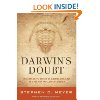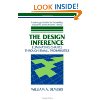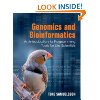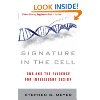Where's my handkerchief? I'm drooling!
... my reaction when I
first discovered this downloadable (free) book which deals seriously
with what I consider to be the quintessential scientific questions of
our time: What is the origin and nature of biological information, of
mind, and of the cosmos?
This compilation is the proceedings of a
symposium held in the spring of 2011 at Cornell University. There are
about thirty chapters, submitted by experts in "information theory,
computer science, numerical simulation, thermodynamics, evolutionary
theory, whole organism biology, developmental biology, molecular
biology, genetics, physics, biophysics, mathematics, and linguistics."
If
you haven't thought carefully about the notion of "information" before,
consider the words you are reading at this very instant. They are
likely on your computer screen, or you could be reading a printed copy.
Nevertheless, the "information" conveyed is the same. Thus, the
"information" is not the material (the medium), your 'mind' is not the
cells in your body, and the 'laws of physics' are not the matter in the
universe. (This not a new notion of course; consider Aristotle's
discussions of form and matter.)
The origin and nature of
biological information is becoming increasingly central to the frontiers
of biology. Even though we can now efficiently read the `letters' in a
biological DNA code, we are only just beginning to learn their meaning
and function. And the complexity and sophistication of the information
and its storage is far beyond what we'd previously anticipated.
In
addition, an entire new field is emerging due to the surprising
discovery that a great deal of biological information is "epigenetic,"
i.e., not stored in the DNA, but in the cellular constituents and
architecture. Thus, it is not sufficient to merely tweak with the
"machine code," one must also anticipate and/or make changes in the
down-stream hardware (which is not described in the machine code) in
order to preserve function.
The density and interdependence of
information storage is also staggering, making evolutionary mechanisms
which rely upon gradual, incremental changes problematic (as required in
NeoDarwinism). For example, most genes perform multiple functions.
While a small mutation in one part of one gene might produce some
incremental advantage in one functional aspect, it would more likely
destroy a dozen other functional advantages it previously had in
combination with the other, non-mutated genes. Not to mention conflicts
with the corresponding downstream, epigenetic structures (information)
necessary to implement the affected functions.
Hold on to your
hat! The biology paradigm train is racing ever faster. If you want to
know where the train is, the chapters in this book provide valuable
landmarks, signposts, and primers along the journey.
How nice to have so much of the leading-edge thinking collected into one volume!













